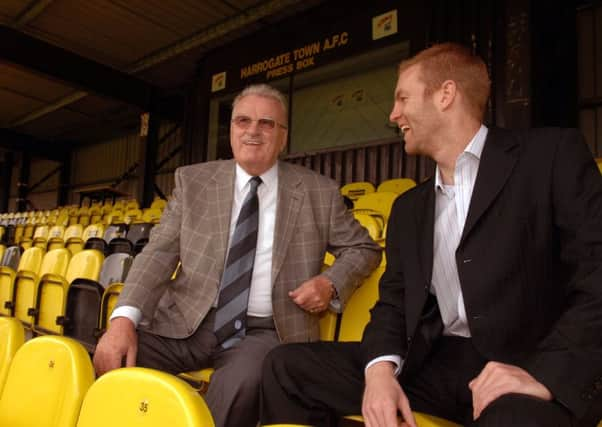Harrogate Town have come a long way in 10 years but we want to go further, says Simon Weaver


The 41-year-old this week chalked up a decade at the helm of the National League club.
It is a feat no other manager in senior football can match, Morecambe’s Jim Bentley coming closest with eight years’ service on the west coast.
Advertisement
Hide AdAdvertisement
Hide Ad“The club is a completely different entity,” says Weaver to The Yorkshire Post about a journey that began for him and Harrogate on May 20, 2009.
“Crowds were in the low hundreds, there was just one stand and the club was in a bit of a pickle.
“I got the job and was told the budget was £1,600 per week. That was to cover everything, including playing squad and management.
“I was told two players had been re-engaged so they were my first two phone calls, only to be told they wanted nothing to do with the club.
Advertisement
Hide AdAdvertisement
Hide Ad“This is no criticism of Bill (Fotherby, former owner). He was brilliant with me.
“That first year was difficult and he could easily have deflected things on to the young, inexperienced manager. He never did.
“But the club was struggling. It was a massive baptism of fire.”
Weaver had turned down the advances of Paul Hirst, then in joint charge of Boston United, to take the Harrogate job.
Advertisement
Hide AdAdvertisement
Hide AdHirst and Rob Scott had offered the then 31-year-old the captaincy at York Street but a move into management appealed, even at a club with obvious problems.
Harrogate finished bottom of Conference North at the end of Weaver’s first season, only avoiding relegation due to Northwich Victoria’s own demotion because of financial irregularities.
A 4-0 defeat to Bradford (Park Avenue) in the FA Cup second qualifying round during that maiden campaign vividly illustrated the problems Weaver was up against.
“Three or four of our team were playing for free,” he says, “basically friends doing us a favour. And this was the FA Cup.”
Advertisement
Hide AdAdvertisement
Hide AdMatters improved the following season, Harrogate finishing 12th, only for owner Fotherby to decide the time was right to sell. Enter businessman Irving Weaver, who had made his money in property. He also happened to be the manager’s father.
“I felt a bit nauseous about the idea at first,” admits Harrogate’s manager with a smile. “I knew it would open me up to all sorts of abuse, how I was only in the job because my dad was chairman and that sort of thing.”
Accusations of nepotism did, indeed, follow. But eight years on surely no one can doubt the marvellous job done by the Weavers.
Harrogate Town, as a club, are unrecognisable. Attendances have soared from an average of 300 to almost 1,600 last term as Harrogate finished sixth to qualify for the play-offs.
Advertisement
Hide AdAdvertisement
Hide AdFacilities have improved accordingly, while the wider Harrogate community feels part of the club thanks to the 3G pitch that hosts home games also being used by local clubs and schools. Around 300 children play football at the CNG Stadium every week.
“The club has come a long way in the past decade,” adds Weaver, who has already signed Accrington Stanley’s Scott Brown and defender Connor Hall from Brackley Town ahead of 2019-20.
“But we want to go further. We want to build on reaching the play-offs and bring more excitement to Harrogate Town.”